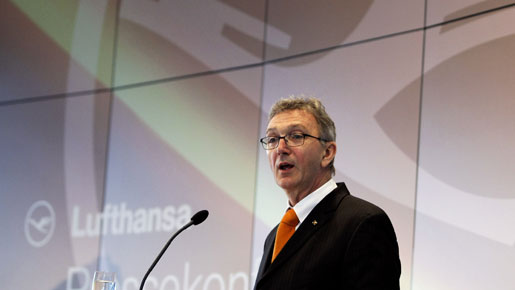
Lufthansa’s Chief Executive Wolfgang Mayrhuber has a nice line in stoic humour. Although Germany’s flagship carrier has most of the problems of its European rivals in the form of sporadic strikes, declining passenger numbers, low-cost competition, red tape and free-falling financials, he somehow manages to remain calm in the storm. “One could say the Wright brothers taught us flying and the Lehman Brothers taught us fear,” he joked at the AGM in March. In fact the Lufthansa CEO doesn’t seem to be too fearful, but it’s certainly a tough time to be in the front seat of an international airline. According to air transport authority IATA, the industry is going through the most severe buffeting in half a century.
Check strikes: Lufthansa’s pilots walked out for four days in February. Check passenger numbers: in percentage terms they’re down by double figures. Check the low-cost competition: well, not too bad because Lufthansa has its own budget airline in Germanwings, which turned a profit. Check red tape: ever since Lufthansa won control of Swiss Air which has greatly prospered under German management, Brussels Airlines (formerly Sabena), Austria Airlines and bmi, Europe’s competition watchdog keeps a close eye on Mayrhuber’s every move.
And finally, check financials: Although Lufthansa scraped a profit of sorts – up 1.4 percent, its blue-ribbon passenger services lost €8m. Even so Mayrhuber, a 40-year veteran at Lufthansa, is doing better than his rivals. “Our modest operating result of €130m is quite a remarkable one”, he notes. Lufthansa is the only European airline with an investment grade rating.
A smaller pond
Indeed he seems almost chirpy about the immediate future of the company. By contrast, major rivals British Airways and Air France KLM lost money last year. The former’s adjusted operating margin fell by 1.4 percent and the latter’s by nearly five percent. He can even joke about the general decline. “It’s more like we are sitting in a large pond and the water level is dropping,” he told current affairs magazine Der Spiegel. “The question is: When will the frogs start croaking?”
Lufthansa’s boss is an unusual species in international aviation. Austrian-born, he’s a tool-maker by trade who joined Lufthansa’s once-lowly maintenance division as an engineer. He attracted the board’s attention by building the Lufthansa Technik into a big earner. And it still is, posting the best profits of the entire group in 2009. But what landed Mayrhuber in the top job eight years ago was the way he conducted a general springclean – sanierung, in German – of a bloated group in the early nineties.
Meantime he’s certainly not croaking. Rather, he puts his faith in a highly focused management style. When you look closely at his stewardship of Lufthansa, Mayrhuber has three special attributes that are helping him fly through the crisis. First, he’s a veteran of the company who joined the firm in 1970 and has worked in most of its divisions.
Consequently, he knows the airline inside out. Second, he’s a master of capital allocation who’s spending heavily, even fearlessly, on revenue-producing assets. Few airline bosses had the nerve to keep pumping money into the business in anticipation of blue skies ahead. But Mayrhuber kept the faith and last year poured €2.4bn into the airline, up by 11 percent on 2008 which was of course a relatively good year. All this in spite of a €2.56bn collapse in revenue. The lion’s share of that money – €1.9bn – went into new aircraft or on down payments on future ones. “We are maintaining the course through turbulent times and are not questioning our fleet modernisation strategy,” explains Mayrhuber. Unusually, Lufthansa owns rather than leases most of its aircraft.
Off the edge
And third, he was ready. As soon as the crisis hit, he cut capacity to meet reduced demand. And most importantly, Lufthansa was in good financial shape. “It has paid off that we have never sailed on the edge and that we made provisions for the balance sheet when the going was good,” he says with justifiable satisfaction. Many a CEO of a heavily indebted listed company would like to say that.
But why the big spend? “There is absolutely no contradiction in saving costs and improving quality – quite the contrary”, he insists. “The combination of the two ensures profitability and sustainable growth”.
But while splashing precious capex on assets that fly, Mayrhuber is rail-roading through the airline something called Climb 2011. Despite the cheerful name, Climb 2011 will be a bumpy landing for surplus manpower. It will send no less than 15 percent of administrative staff out the departure lounge while freezing administrative salaries, banning new hirings and hacking away at costs. Climb 2011 aims to cut a permanent €1bn a year out of the running expenses of the passenger business alone by the end of 2011.
Everybody’s hurting
The carrier’s suppliers are also sharing the pain because Lufthansa has told them to cut margins. And so are the shareholders hurting. There’ll be no dividend this year – “economically unjustifiable”, says Mayrhuber bluntly. The boss makes no bones about the reason for the restructuring because, he says, everybody’s going to have to do it: “This may also be painful, but all companies in the aviation companies will have to implement these processes if they intend to survive the crisis without any lasting damage and prosper in the future.”
Typically, Mayrhuber doesn’t apologise. “Large companies that have reeled in great results year after year tend to put on a couple of extra pounds around the hips; the time has come for these pounds to go.” Thus Lufthansa may end the year as the biggest loser in terms of kilos– and the biggest winner in terms of preparedness for the inevitable turnaround.

